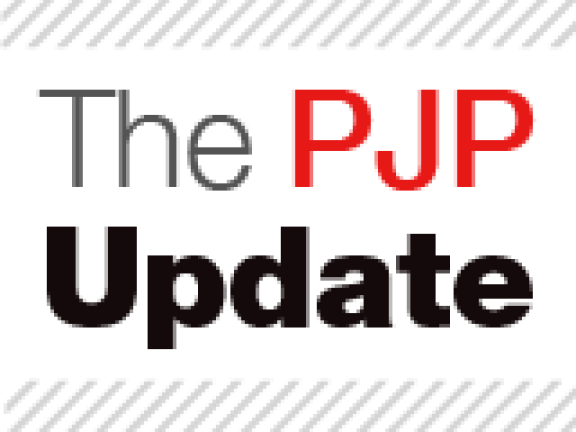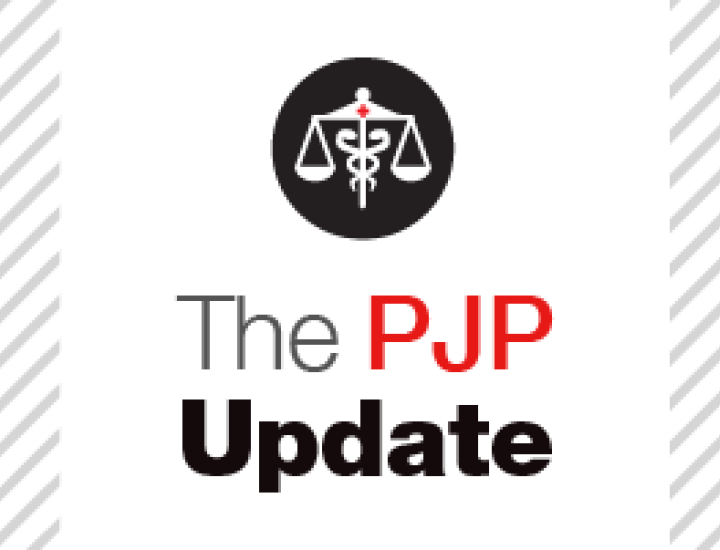Published August, 2016
The PJP Update - August 2016

State Advocacy Working Group Updates
 COLORADO
COLORADO
After the recent modernization of criminal laws in Colorado, The Mod Squad has started conversations about work going forward. Included in these plans are attending upcoming meetings of the State Board of Health and discussing the rules changes they have recommended.
Meetings are the last Tuesday of the month, 6:00-8:00pm (MT). Next meeting is Tuesday, August 30.
If you are interested in information about HIV criminalization or actively participating in the Colorado working group, please contact Barb Cardell at [email protected].
 GEORGIA
GEORGIA
In June, the Georgia Working Group organized itself into two major teams: one focused on community mobilization, and another focused on continuing legislative strategy; and made plans to extend community outreach in the state.
In anticipation of further outreach efforts, in July the Georgia Working Group renewed a discussion of language and values they want reflected in their work, to ensure that all new and past members are on the same page.
Next meeting: Wednesday, August 24, 6:00-8:00pm (ET)
If you would like information on HIV Criminalization or are interested in becoming an advocate with the Georgia HIV Criminalization Working Group, please contact Lauren Fanning at [email protected]g.

INDIANA
A new group in Indiana—HIV Modernization Movement (HMM)—was recently formed to work on modernizing Indiana’s HIV criminal laws. The group created a steering committee and has since met twice to work on startup efforts. They now have a website, Facebook page, and Pinterest site. The Steering Committee meets monthly and all are welcome to call in for those meetings.
Next meeting: Monday, August 29, 6:00pm (ET)
If you are interested in information about HIV criminalization or participating, supporting or endorsing HMM-Indiana, visit the get involved page or contact Carrie Foote at [email protected].
 MISSOURI
MISSOURI
The Missouri HIV Justice Coalition, with staffing support from Empower Missouri, has continued discussions on document revisions and strategic planning on best approaches to producing an effective, cohesive message. Reaching consensus on benchmarks, goals, and coalition building is ongoing. The Documents Review Committee also continues strategizing on creation and publication of all materials relevant to law modernization efforts in the state.
To continue strengthening the coalition, the group encourages new participants, including those who focus on racial justice, are members of faith communities and those living with HIV, to actively take part in the Missouri Justice Coalition’s efforts.
Next meeting: Friday, August 26, 1:00pm (CT)
If you would like information on HIV Criminalization or are interested in becoming an advocate with the Missouri HIV Justice Coalition Working Group, please contact Ashley Quinn at [email protected] or Stephen Williams at [email protected].
 OHIO
OHIO
The Ohio legislature Recodification Committee is working on recommendations for updating Ohio criminal code. The work will not be finished until November, but they expect to have a draft of some of the recommendations for review in September.
The Ohio Working Group has been having conversations about coalition building and outreach to the legislature. Some state representatives and a senator have expressed their support for their work to change the laws. In preparation for discussions with legislators and responding to the Recodification Committee’s recommendations, Ohio advocates have developed a new set of talking points.
Next meeting: A new meeting time is being reviewed. Currently the next meeting is Monday, September 12, 4:30pm (ET).
If you are interested in information about HIV criminalization or actively participating in the Ohio working group, please contact Stephen Williams at [email protected].
 TENNESSEE
TENNESSEE
The Tennessee working group is considering two draft bills, possibly to introduce in the 2017 legislature. They have a 30/60/90-day plan to build their coalition, educate community members, talk with potential sponsors in the legislature, and hold a community stakeholder meeting in October.
Scotty Campbell is leaving Nashville Cares at the end of August, and the Working Group members want to thank him for his hard work, gentle guidance, and the wisdom of his experience with a heartfelt “Thank You and We Will Miss You!”
Next meeting: Thursday, August 25, 11:00am (CT)
If you are interested in information about HIV criminalization or actively participating in the Tennessee working group, please contact Stephen Williams at [email protected].
 TEXAS
TEXAS
The Texas HIV Criminalization Working Group just announced that Stacie McNulty, Director of Hope Capetown USA, and Venita Ray, Public Affairs Field Specialist of Legacy Community Health, were unanimously elected as Group Co-Chairs by participating group members. Congratulations to Stacie, Venita and the Working Group; there is no question they will do a stellar job advancing their advocacy agenda.
Meanwhile, the group has reached consensus on message and goals and presses toward finalization of its talking points. Group members are also pulling together contacts and resources focused on innovative ways of gathering arrest and prosecution data in states where general criminal statutes are used.
Meetings are usually held on the third Friday of the month.
If you are interested in information about HIV criminalization or actively participating in the Texas HIV Working Group, please contact Stephen Williams at [email protected].

CHLP assists criminal defense attorneys in HIV exposure/transmission cases. We are providing help in cases in a number of states across the country. Among the cases we currently are involved in are the Michael Johnson, Nushawn Williams (a/k/a Shyteek Johnson), and Orlando Batista cases in Missouri, New York, and Ohio.  MISSOURI
MISSOURI
In April, CHLP, with 21 national and state HIV/medical and racial justice organizations, one individual, pro bono assistance from the Gibbons PC law firm, and local assistance from the ACLU of Missouri Foundation, submitted an amicus curiae (friend of the court) brief in the appeal of Michael Johnson’s conviction to the Missouri Court of Appeals, Eastern Division. The brief argued that (1) the act violates the Equal Protection Clause of the United States Constitution because it imposes burdens on people living with HIV, by singling them out among those living with other sexually transmitted diseases, without rational justification; (2) the act violates the right to privacy in personal medical information; (3) the act violates prohibitions against discrimination on the basis of a disability; and, (4) the sentence of thirty years is cruel and unusual punishment in violation of the Eighth Amendment because it is so grossly disproportionate to the offense due to the change in life expectancy and quality of life for those living with HIV.
Johnson’s appellate attorneys filed his appeal in April, raising fundamental procedural and constitutional errors. The State of Missouri filed its responsive brief on August 15. Oral argument will occur on September 12.
 NEW YORK
NEW YORK
In May, the Supreme Court of the State of New York, Appellate Division, Fourth Judicial Department, issued a unanimous decision rejecting Nushawn Williams’ arguments that his indefinite commitment as a dangerous sex offender was not supported by either law or the factual record. Williams was indefinitely civilly committed under Article 10 of the New York State Mental Hygiene Law after fully completing his criminal sentences. CHLP had filed an amicus curiae brief in support of Williams, arguing in part that an individual’s HIV status cannot be a factor in a determination that the person warrants indefinite commitment.
Several days ago, Williams' attorney, Mark Davison, filed a motion for leave to appeal the Appellate Division’s decision to the New York Court of Appeals. In the next two weeks, CHLP, with support from other amici, will file a motion in support of Williams' leave to appeal and for leave to participate in the Court of Appeals as amicus curiae.
 OHIO
OHIO
In July 2014, Orlando Batista was indicted for felonious assault for allegedly engaging in sexual conduct with his girlfriend without first disclosing his HIV status to her. After the trial court rejected his motion to dismiss, Batista pleaded no contest and the court sentenced him to the maximum term of eight years. Batista filed an appeal, and in May 2016, the Court of Appeals, First Appellate District, affirmed his conviction. His attorneys at the Hamilton County Public Defender then filed a motion asking the Supreme Court of Ohio to exercise jurisdiction and hear the appeal of the Court of Appeals decision.
CHLP assisted the ACLU of Ohio in developing arguments in the case and soliciting participation in an amicus memorandum that was filed on June 20 by the ACLU of Ohio, supporting the defendant’s request for leave to file an appeal. Issues argued are that Ohio’s felonious assault statute: (1) violates the Equal Protection Clauses of the Ohio and United States Constitution because it singles out people living with HIV for prosecution in response to conduct that is not criminal in the case of other groups, for example those living with other sexually transmitted diseases; (2) compels speech in violation of the First and Fourteenth Amendments of the Constitution; and, (3) violates the Americans with Disabilities Act for reasons similar to those in point one.
On July 13, the State of Ohio filed its opposition to defendant’s request that the Supreme Court exercise jurisdiction in the case. To date, no decision has been rendered by the Ohio Supreme Court.
CHLP’s assistance in criminal cases includes counseling defendants and their families, referring defendants to attorneys, providing legal and trial strategy advice to defense attorneys, referring medical and scientific experts, drafting sections of court submissions, and submitting amicus briefs.
If you are aware of anyone charged in an HIV exposure or transmission case, please refer them to our website, www.hivlawandpolicy.org and/or have them or their lawyer, contact CHLP (212-430-6733) for assistance.
Copyright Information: CHLP encourages the broad use and sharing of resources. Please credit CHLP when using these materials or their content. and do not alter, adapt or present as your work without prior permission from CHLP.
Legal Disclaimer: CHLP makes an effort to ensure legal information is correct and current, but the law is regularly changing, and the accuracy of the information provided cannot be guaranteed. The legal information in a given resource may not be applicable to all situations and is not—and should not be relied upon—as a substitute for legal advice.


